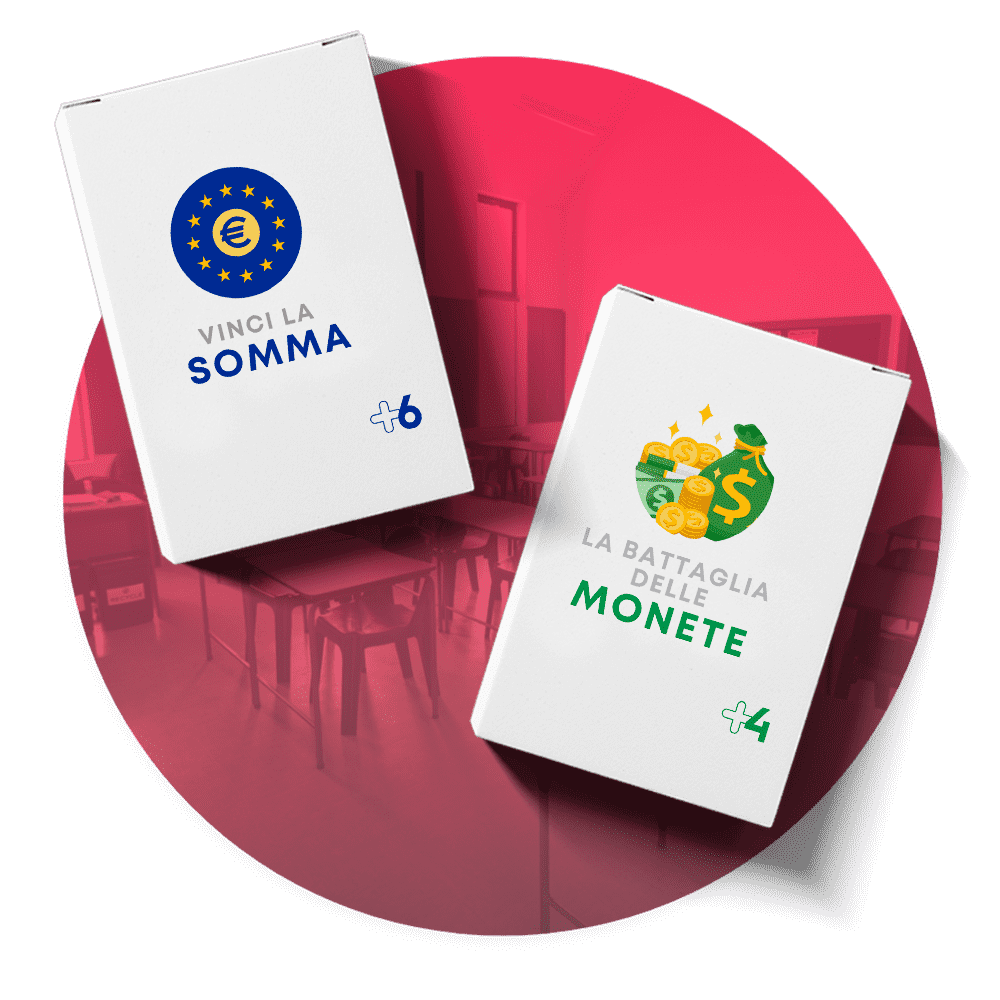Card Games
Financial literacy is a fundamental skill that should be nurtured from a young age. Financial education card games offer a fun and engaging way to teach children and teenagers the key concepts of money management, helping them develop a healthy and responsible financial mindset. These games combine learning with play, making financial concepts accessible and interesting for young people of all ages.

Card Games for Children and Teens



Finance made simple
Understanding financial concepts can seem like a daunting task, but thanks to our Finanza Facile® method, we can make it simpler and more accessible. It’s a practical, straightforward approach that demystifies personal finance and makes financial concepts easy for everyone. Whether you’re looking to save for the future, better manage your budget, or learn how to invest without falling into mental traps, the Finanza Facile® method provides the tools and knowledge you need.


Our card games
Financial education card games are educational tools designed to teach children and teenagers the basics of personal finance through a playful approach. Each game consists of a deck of cards, each representing a specific financial concept, an economic decision, or a realistic money management scenario. These games can be used in various settings, such as school, home, or during extracurricular activities, and are suitable for individual players or groups.
The cards often include key information, practical examples, and scenarios that players must navigate, such as saving for a goal, managing a budget, or deciding how to invest their money. Every decision made in the game has consequences, allowing young people to tangibly see how their financial choices can affect long-term outcomes.



Why choose them
Learning Through Play: Financial education card games make learning about finance a fun and engaging experience. Play is a natural way for children to learn, and through interacting with the cards, young people can absorb complex concepts in a simple and intuitive way. Learning through play fosters a deeper, lasting understanding, as children and teens not only memorize information but actively apply it during the game.
Developing Basic Financial Skills: Card games help young people develop essential financial skills that will benefit them throughout their lives. Through play, they learn to plan a budget, save for specific goals, understand the value of money, and make informed financial choices. These skills are vital for building a solid foundation of financial awareness, preparing them to face the economic challenges of adulthood.
Promoting a Responsible Mindset: One of the primary goals of financial education card games is to promote a responsible financial mindset. Children and teens learn to recognize the importance of saving, planning, and managing resources wisely. Through the game, they safely experience the consequences of their financial decisions, learning to make more thoughtful and informed choices.
Interactive and Collaborative Teaching: Card games are perfect for collaborative learning. They can be played in groups, encouraging discussion and the sharing of ideas among participants. This type of interactive learning helps children and teens engage with their peers, explore different strategies, and learn from each other’s mistakes. Additionally, card games can be used as teaching tools in classrooms, facilitating practical and engaging lessons.



Where to use them
In the Classroom: Teachers can integrate financial education card games into the school curriculum as part of economics, math, or civic education lessons. These games can be used to make lessons more dynamic and help students better understand financial concepts through a practical and interactive approach. Games can also be used as group activities, promoting collaboration and teamwork.
At Home: Parents can use card games as an educational tool during family time, turning evenings together into an opportunity to teach their children the basics of personal finance. Playing together not only strengthens family bonds but also gives parents a chance to discuss money and finance in a relaxed and fun environment. Card games can become a regular and enjoyable way to build financial skills progressively and naturally.
During Extracurricular Activities: Card games can be introduced in school clubs, summer camps, or other extracurricular activities. This makes them ideal for informal settings where children and teens can learn through play without the pressure of school evaluations. Educators can use these games to introduce financial concepts in an accessible and engaging way, keeping students highly involved.
In Workshops and Seminars: Educators and financial advisors can use card games during workshops and seminars aimed at children, teens, or families. These games serve as practical tools for explaining financial concepts interactively and encouraging active participation from attendees. Through play, participants can explore different financial scenarios, discuss their choices, and learn collaboratively.
The best for you
Do you need a tailored solution or a customized product?
Frequently Asked Questions
Financial education is the process of learning and understanding how to manage money effectively. It includes knowledge about saving, investing, debt management, budgeting, and long-term financial planning. The goal is to develop skills that enable individuals to make informed and responsible financial decisions.
Financial education is essential because it helps people better manage their money, avoid financial pitfalls, and plan for the future. Good financial knowledge can prevent issues such as excessive debt, lack of savings for emergencies or retirement, and improve overall economic well-being.
Everyone, regardless of age, social status, or income, can benefit from financial education. Young people can learn to manage their first earnings and savings, while adults can enhance their financial planning and investment skills.
What are the main topics covered in financial education?
Financial education covers a wide range of topics, including:
• Budgeting: How to create and maintain a budget to manage income and expenses.
• Saving: The importance of saving money and strategies to do so.
• Investing: The basics of investing and how to grow your capital over time.
• Debt Management: How to avoid, manage, or reduce debt.
• Planning for the future: How to financially prepare for future events, such as retirement or buying a house.
There are several resources available to improve financial education, including books, online courses, workshops, and financial advisors. Additionally, many banks and organizations offer free financial education programs.
Financial education provides the knowledge and skills to manage money independently, while financial consulting involves receiving personalized advice from a certified professional registered in the financial advisors’ registry.
A good level of financial education contributes to greater economic security and reduces stress related to financial problems. Knowing how to manage money enables more conscious decision-making, improving quality of life and the ability to achieve financial goals.






